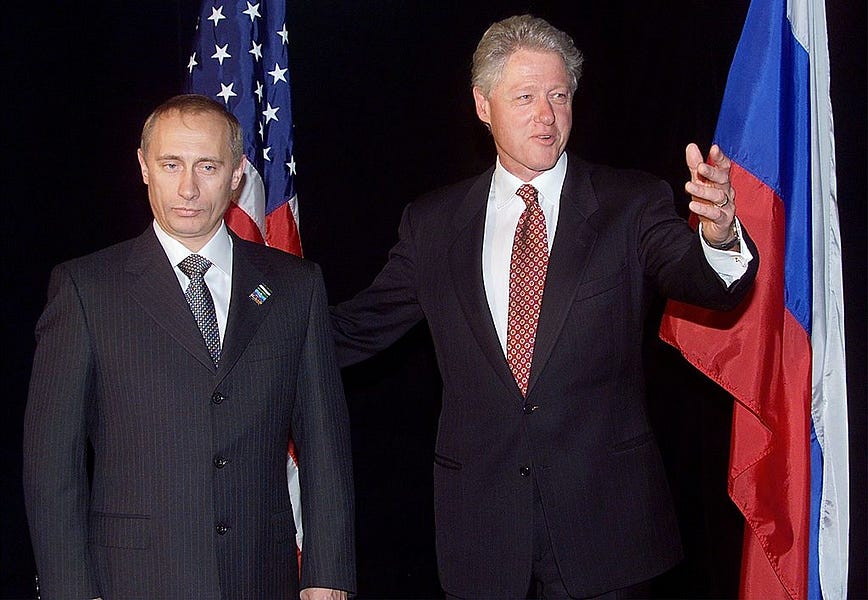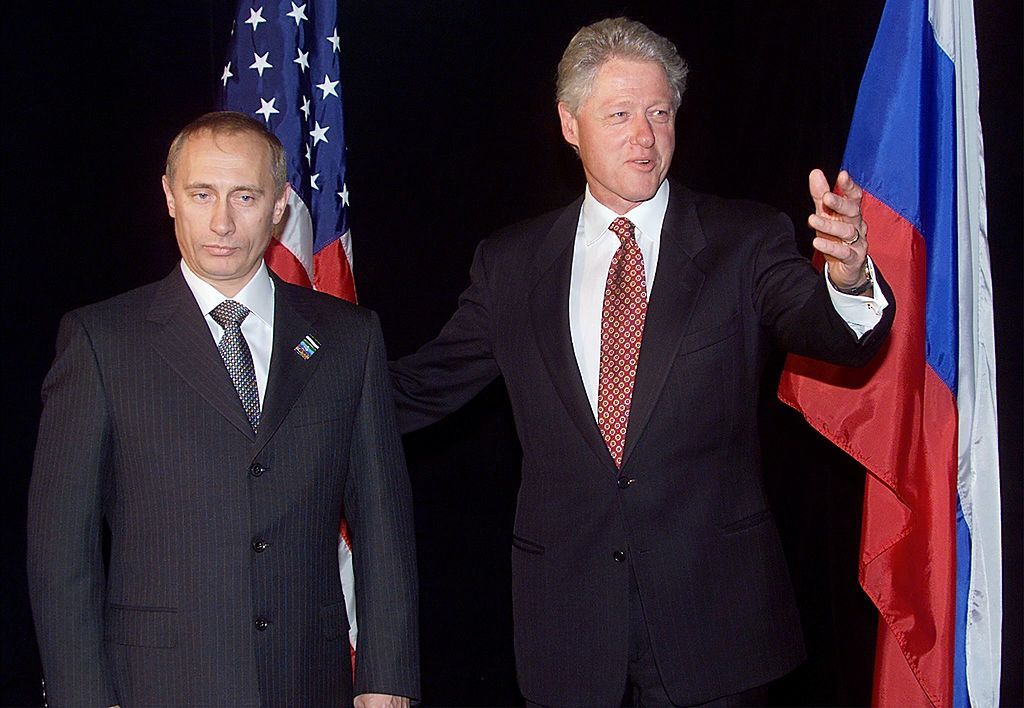Making Ordinary Russians Suffer for Putin's Invasion
Neither Putin nor his oligarchs will suffer from U.S. and European economic siege warfare—it's part of how Putin rose to power in the first place. Plus: a Xius ex machina?



Edited by Sam Thielman
JUST WHEN IT SEEMED like we were getting somewhere in the reconsideration of economic besiegement as a tool of statecraft, Vladimir Putin invaded Ukraine.
The Russian people—specifically, those least equipped to withstand it—are about to feel intense economic pain. On Monday, the U.S. and the European Union moved against the Central Bank of Russia (CBR). Economist Esfandyar Batmanghelidj calls going after a state's central bank "the most significant measure in any financial war because of the direct impact on the national currency." Biden administration officials, in Reuters' paraphrase, expect the sanctions to "to push Russian inflation higher, cripple its purchasing power and drive down investments." That comes on top of the removal of Russian banks from SWIFT; prior waves of sanctions over the past week; and the extraordinary decisions by Germany to not only cancel the Nordstream 2 natural-gas pipeline—I see a bipartisan coalition of congressmembers, including Elissa Slotkin and Liz Cheney, pushing a bill that will aid U.S.-based hydrocarbon corporations in stepping into that breach—but spike its defense spending.
The ruble has lost 30 percent of its value in a week. The CBR raised interest rates to stabilize the currency. The AP on Monday reported on Russians queuing up to get money out of their banks in expectation of skyrocketing prices that will presage "a drop in the standard of living for the average Russian." Elina Ribakova of the Institute of International Finance told the wire service, "We are in [the] uncharted territory of throwing all these nuclear options of sanctions at Russia at the same time over the weekend."
Perhaps the specific point we're on is uncharted. But the path we're on isn't. Putin himself traveled a path disturbingly like it to obtain power.
FOREVER WARS is part of the Discontents Substack cartel, and with cartelization comes benefits. Subscribe to Forever Wars for a year and receive six FREE months of two of our affiliated newsletters, Welcome To Hell World by Luke O’Neil and Derek Davidson’s Foreign Exchanges. Both of them are excellent, and you’ll get them both at the subscriber tier. Subscribe today! And remember: REIGN OF TERROR is available now!
SANCTIONS HAVE A TERRIBLE track record of producing changes in regime behavior. They have an excellent track record of inducing or deepening poverty among the people least able to change a regime's behavior. A new paper by Batmanghelidj, released as the sanctions packages rolled out, serves as a vivid reminder that a weapon fired indiscriminately at an economy as highly unequal as theirs or ours will wreak proportionally unequal havoc. Putin and the oligarchs have countermeasures. Ordinary Russians do not.
You'll remember Batmanghelidj from his January analysis of sanctions on Iran. He finds that the sorts of sanctions placed on Russia are comparable. While the Russian and Iranian economies are different sizes, both are energy exporters with large manufacturing sectors for meeting internal demand. "Across key indicators," Batmanghelidj finds, "Russia appears in a stronger position than Iran was at the outset of its financial war."
What he means is that Russian elites are in a stronger position. Russian people are in trouble. Batmanghelidj (with my emphasis):
There is significant potential for domestic wealth to pour into the stock exchange, whether spurred by the inflationary environment or encouraged as a matter of new government policy. The implication is that capital markets are useful tools for preserving capital—the desperation of middle and working classes in Russia may help shore up the wealth of oligarchs, already in stocks and real estate. Many of the enterprises that oligarchs control may successfully adjust to the new reality and remain profitable. A new class of “light” oligarchs may emerge as certain light manufacturing enterprises benefit from reduced competition and better export prospects. The financial war could also provide a pretext for state capture, with private capital facilitating rentierism, corruption, or smuggling deemed expedient in the face of sanctions.
Take all of this together and it becomes clear that the most problematic aspects of Russian political economy—the obscene concentration of wealth among a politically-connected ruling class—will remain unchanged in the financial war. Meanwhile, the immiseration of the middle and working classes will further disempower civil society, creating a dynamic where dangerous protests are the only means through which to air grievances and in which deprivation focuses those protests on wages and bread.
(My emphasis.)
The Russian people did not invade Ukraine. Vladimir Putin did. Putin's autocracy renders the Russian people, who under this reprisal program will suffer the most, especially blameless for the invasion. (The Russian people are engaging in some of those "dangerous protests" to register their disgust with the invasion; but even if they didn't, that would not make aiming a weapon at random people OK.) It is in this manner that we see the structural problem with weaponizing inflation.
But we tend to lose sight of it in moments like this.
Putin has succeeded in uniting American and European decisionmakers very squarely against Russia. But that unity does not create any lever to oust the Russians from Ukraine, particularly now that Putin has taken the escalatory step of placing his nuclear forces on alert. So foreign capitals prefer to reach for what Simon Jenkins calls in Monday's Guardian "the capitalist equivalent of medieval siege and famine." They think of such a weapon as substituting for war, rather than one on a continuum with war.
And so millions who did not choose to invade Ukraine have their lives upended—some will be outright ended—on the theory that such suffering will prompt Putin to… what? Withdraw from the February 24 status quo ante? Withdraw from the Donbass? Dan Drezner doesn't understand either. Batmanghelidj this morning tweeted the sobering observation that banks are hesitant to re-engage with institutions formerly under sanctions even after sanctions end.
I have zero desire to play Fake Russia Expert. But it is conspicuous that the mass economic misery of 1990s Russia, alongside the internal post-Soviet political destabilization, was a structural factor contributing to Putin's rise, and the rise of the contemporary Russian elite, in the first place. (Putin spent the 1990s doing things like inviting the first foreign capital into St. Petersburg and, under Boris Yeltsin's "Minister of Privileges" Pavel Borodin, "disposing of properties that were no longer worth having and reasserting Russia's sovereignty over those that were," writes Stephen Lee Myers in The New Tsar: The Rise and Reign of Vladimir Putin.) What if we didn't recapitulate the conditions that did that?
I will not pretend to know what can compel Putin to withdraw from Ukraine—well, besides a phone call from Xi Jinping*—but this is someone suspected of being the wealthiest man in the world. Is he going to feel compelled to withdraw because of the suffering of people to whom he is not accountable? Are they supposed to organize to depose him, after 20 years of successful suppression of Russian opposition forces, and this time while suffering? Iran's experience, Batmanghelidj observes, might be prophetic here as well:
Western governments will no doubt be able to cause massive damage to the Russian economy, but the individuals who comprise that economy will attempt to adjust. The Russian public, like the Iranian public, is at best ambivalent about the policies of their leaders in response to which sanctions have been imposed. In Iran, a decade later, there is a widespread sense that the price endured by ordinary people is no longer proportional to the wrongs committed by their government. If the sanctions persist in the aftermath of a cessation of the conflict in Ukraine—which is likely—a similar reality may come to pass for Russia. In this context, the resilience of ordinary people in the face of financial war will not be an act of political resistance, but of basic survival. They will toil for low wages in factories and fields, struggling to put food on the table and at times they will protest, facing down the violence of the state. Meanwhile, the economy will stagnate. So too will a dismal political reality.
And while that persists, so would the occupation of Ukraine. I have no idea what will happen on the ground; I am not there; read reporters like Jack Crosbie who are. It may be that Ukrainians are conquered but not vanquished and will launch insurgencies to make Russian occupiers suffer. Remember that Putin can still make Kyiv into Aleppo. Before Aleppo, he did it to Grozny, which was "reduced to ruins," writes Myers, "the likes of which had not been seen in Russia—or anywhere else—since the Great Patriotic War." (That's WWII.) As of Tuesday, reports are that Russian armor is encircling Kharkiv and launching artillery at civilian targets in Kyiv.
While I write, I'm listening to Tony Wood tell The Dig that is the first time he's felt that Putin has engaged in a truly irrational foreign-policy decision. A lot of grim possibilities have opened up in six short days. Inflicting deliberate harm on the Russian working and middle classes is not a mechanism to stop those possibilities. It's a mechanism to compound them.
*CAN YOU EVEN IMAGINE the U.S. reaction if China delivers a Xi-us ex machina in Ukraine? That would probably cause us to say that the 21st century truly begins in 2022.
I get the impression that the sanctions packages, the U.S. military deployments to Europe and so forth are premised on the idea of shocking Putin into quickly reversing himself, while not really having a Plan B besides more sanctions. A similar impression prompted Drezner to write, "as satisfying as it might feel in the moment, 'imposing costs' cannot be an end in itself." (Plan C is a white-knuckle deliberation about materially supporting a future insurgency against a nuclear power. The last time we did that didn't work out so well for us in the long run!) Well, is there anyone better positioned to deliver a short war than Xi?
Over the past six days, much has been made of how, after the "No Limits" partnership Xi and Putin announced on Feb. 4, China's formal geopolitical pledge of noninterference is fatally compromised by the Ukraine invasion. That analysis seems true, but in my view, it overestimates the need for superpowers to be consistent. They need only be powerful and rich, as proven by any number of awkward Cold War client relationships by the U.S. and the Soviet Union.
But what if Xi actually called the bluff and pressed Putin to leave Ukraine? I suppose this is where a Foreign Policy Columnist would say something like China Is Facing A Test Of Its Power—And Its Purpose. But if Xi is interested in a diplomatic masterstroke, he could save Ukraine while exposing Washington as a bystander to the history it presumes its birthright is to control.
Anyway, this is all no more than wishcasting—I am definitely not a China expert and will not fake being one of those, either—as my mind spirals contemplating the horrors to come. I have zero insight into whether Xi has any interest in stopping the Russian invasion. I just (a) can't think of anyone who has greater leverage over Putin right now, (b) can't think of what a negotiated settlement to reverse the invasion could be and (c) am imagining "the West" and its partisans simply losing their minds over China delivering what they likely can't.
Given that this Xi idea is a short step up from shitposting, it felt necessary to call up someone who knows what they're talking about: Jordan Schneider of the ChinaTalk newsletter, which I learn from even when I disagree with a premise or two.
Jordan was very patient with me. He did not consider the question of Chinese diplomatic involvement ridiculous, which came as a relief. But he pointed out some reasons for skepticism—Xi may, for instance, not consider Russia as viable an economic opportunity as the West is. Given the state of China's economy ("not all rainbows and butterflies here," Jordan points out), Beijing might also not have the capital necessary to bail out the Russians as the West attempts a punitive economic divorce.
"From Xi's perspective, if the deal you're making with Putin ends up jeopardizing your country's future relationship with the West and access to their markets, is that a trade you're willing to make?" he said. "It has to be framed as, this is a Nobel Prize thing, I'm giving you the off-ramp the West isn't."
Jordan continued: "A slightly less dramatic version of this debate1 thinking about how to muddle through China's relationship with Russia is definitely happening in China right now. Keep in mind though that the PRC post-Mao hasn't really been known for dramatic foreign policy flair, [and] instead has been much more comfortable letting the chips fall where they may in issues outside Asia."
lol

